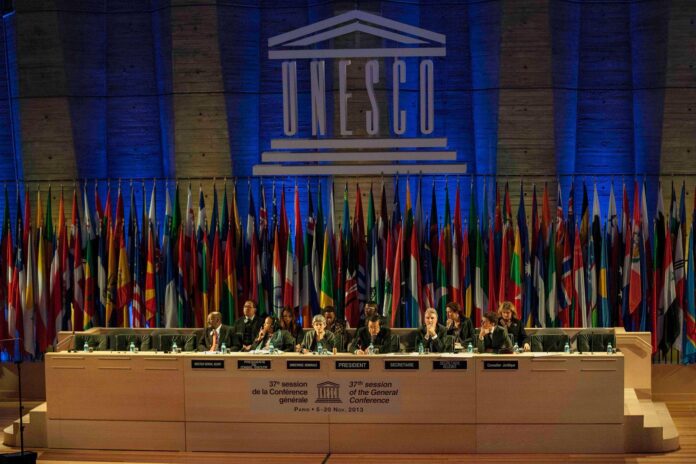The United States might rejoin Unesco, more than four years after their most recent departure. An article in the $1.7 trillion Omnibus Appropriations Bill passed on 22 December (which sets out the funds for the US federal government through the rest of the fiscal year) paves the way for the Biden administration to rejoin and finance the Unesco organisation—the United Nations (UN) culture and education body—as well as pay the huge debt accumulated in membership dues.
The most recent rupture between Unesco and its main donor began on 31 October 2011 when an overwhelming majority of its members accepted Palestine into their ranks as a member state. The Obama administration had no choice but to abide by a 1990 law forbidding funding to any international body acknowledging the country as an independent state. The sudden cut sent the UN agency, which is in charge of international programmes related to culture, education, science and communication, into a tailspin. The US accounted for 22% of its budget, or some $80m annually.
The controversy flared again with the inclusion of the old city of Hebron and the tomb of the patriarchs as a Palestinian site on Unesco’s list of world heritage in danger.
However, President Obama did not go so far as to officially quit, even keeping a seat on Unesco’s executive board (up to now, the US have also maintained participation in the most successful programs such as World Heritage and the Intergovernmental Oceanographic Commission). The formal withdrawal came on the stroke of midnight on 1 January 2019, with President Trump denouncing its “anti-Israeli bias” and “nonsense”. Israel followed suit. As of December 2020, the US owed Unesco around $616m in unpaid membership dues.
The article adopted in December 2022 by Congress grants a waiver to the 1990 law. Last April, Secretary of State Anthony Blinken pleaded for this move in front of lawmakers saying: “When we’re not at the table helping to shape the norms and standards” for education or artificial intelligence, “someone else is. And that someone else is probably China.” He also confided that Israel would not oppose the move.
Contributing up to $65m to a $500m budget, China has become Unesco’s main financier. Acknowledging its importance, in 2018 the post of Unesco’s deputy director-general was given to a Chinese diplomat, Xin Qu. The same year, Audrey Azoulay chose China to make her first official visit as director-general of Unesco, staging an “historic” meeting with President Xi Jinping. A European diplomatic source who wishes to remain anonymous told The Art Newspaper that several Western delegations have opposed the planned relocation of the International Bureau of Education, Unesco’s curriculum framing body, from Geneva to Shanghai, alarmed by the lack of academic freedom in the country.
When she was elected director-general in 2017, Azoulay, the former cultural advisor of French president François Hollande, claimed “the US were not the alpha and omega of Unesco”. But, preparing her reelection, in 2020, she praised the “historical links” between the organisation and America.
The new US waiver will expire on 30 September 2025, unless renewed by Congress. Any ensuing membership procedure would have to be submitted to Unesco’s next General Conference in November 2023, not to mention the negotiation on the reimbursement of the debt.
Unesco and the US embassy in Paris have both declined to comment.
If the US rejoined Unesco, it would be their second comeback in the history of the body. In 1984, during the final years of the Cold War, the Reagan administration withdrew from the agency, accusing it of anti-Western bias under the influence of developing countries. In 2002, President George W Bush announced the country’s return to Unesco, at a time when he was courting his allies before the invasion of Iraq.

























